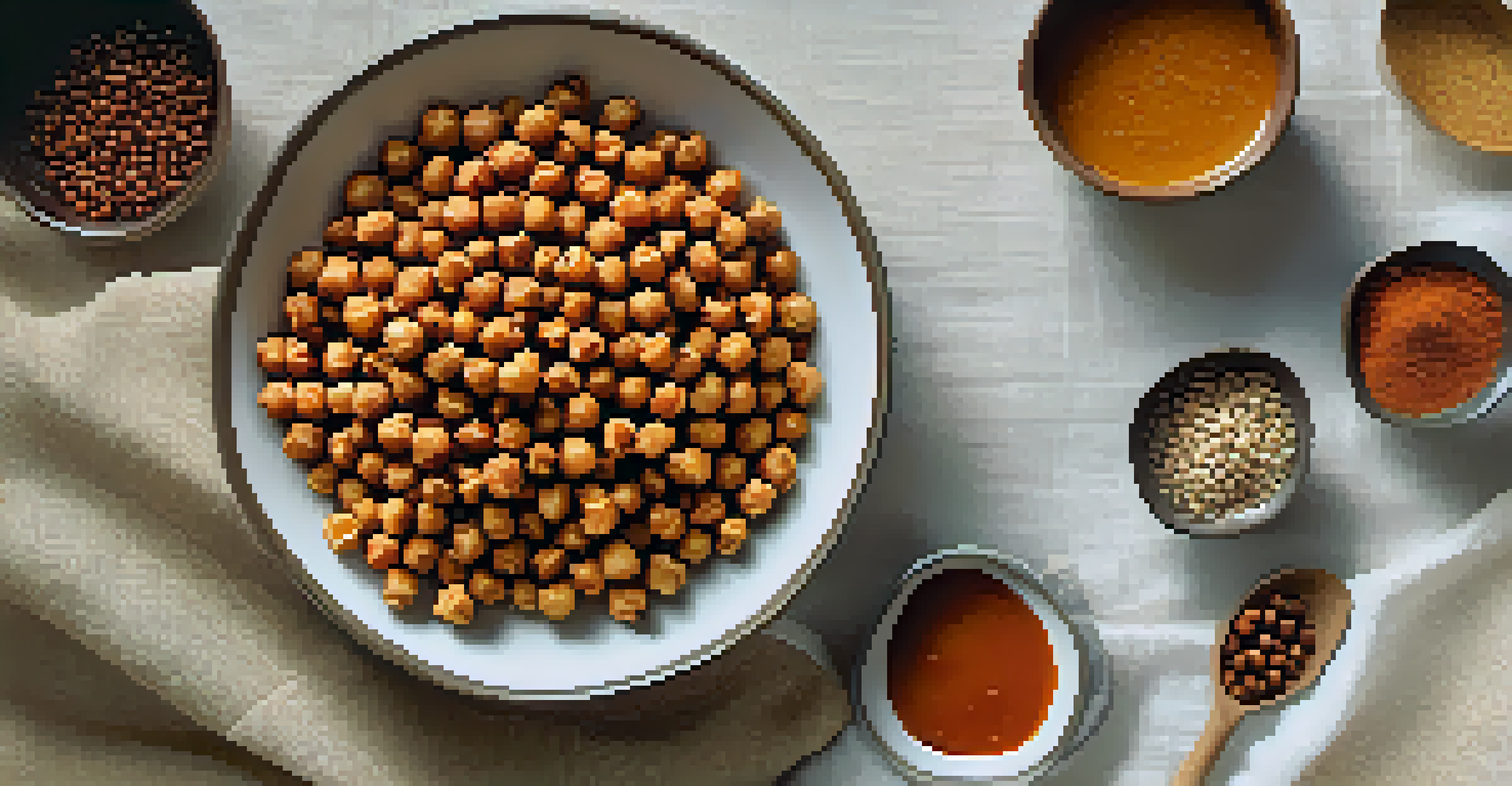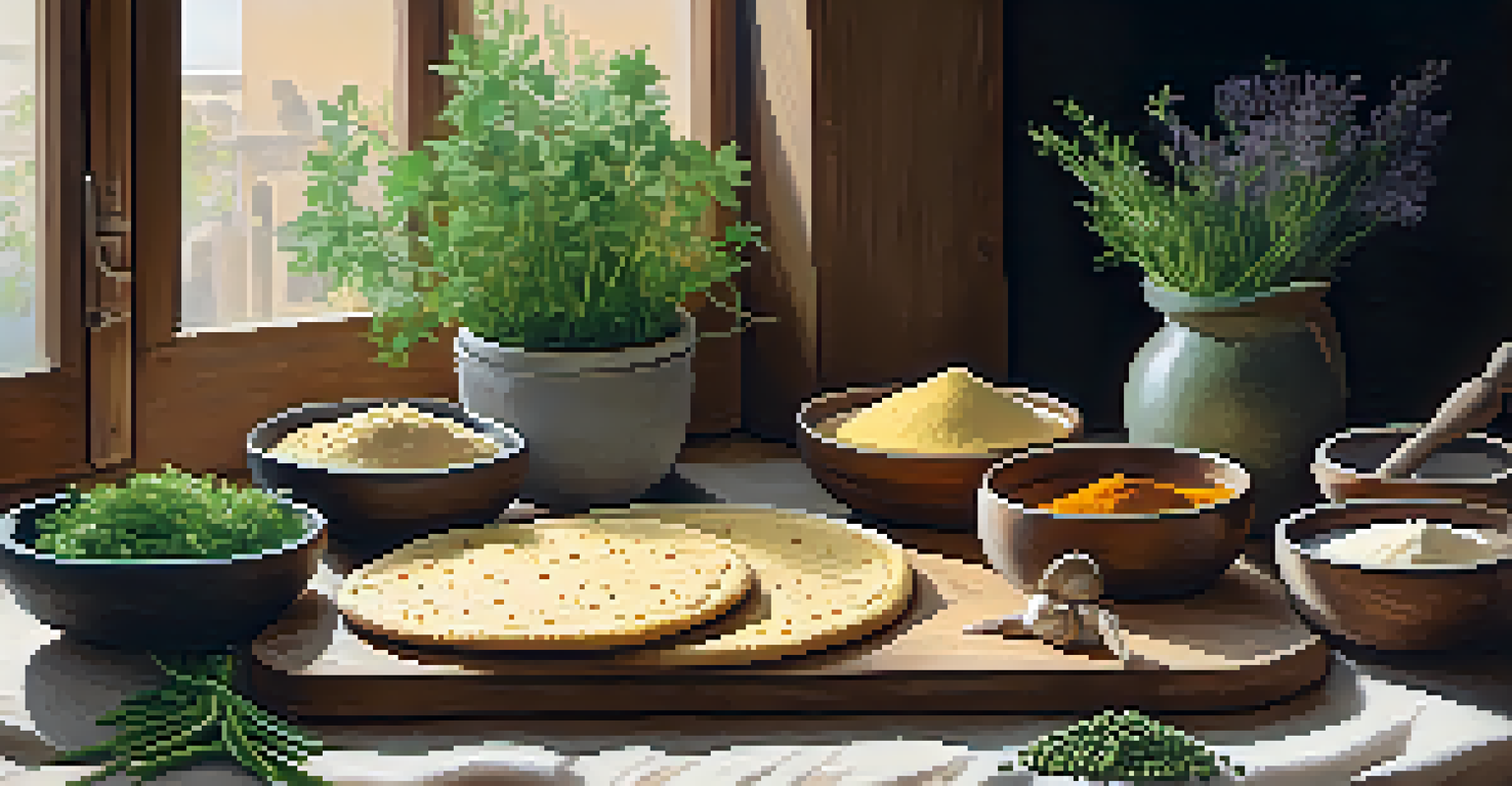Chickpeas as a Protein Source: Versatile Vegan Ingredient Ideas

Why Chickpeas Are a Great Protein Source
Chickpeas, also known as garbanzo beans, are a fantastic source of protein, making them an essential ingredient for vegans. With about 15 grams of protein per cooked cup, they offer a nutritious alternative to meat. Their high fiber content also promotes digestive health, making them a win-win in the nutrition department.
Let food be thy medicine and medicine be thy food.
Not only are chickpeas packed with protein, but they also contain essential vitamins and minerals such as iron, magnesium, and folate. This nutrient profile is particularly beneficial for those following a plant-based diet, helping to fill in the gaps that might occur without animal products. Plus, their low glycemic index means they can help keep your blood sugar levels stable.
Their versatility is another reason why chickpeas shine in the kitchen. You can toss them into salads, blend them into dips like hummus, or roast them for a crunchy snack. This adaptability makes them a favorite among both seasoned cooks and kitchen novices alike.
How to Incorporate Chickpeas into Your Meals
Incorporating chickpeas into your meals is easier than you might think. A simple way is to add them to salads for an extra protein boost and a satisfying texture. You can also include them in grain bowls or stir-fries, where they can soak up flavors from other ingredients.

Another popular method is to blend chickpeas into dips, with hummus being the most famous example. Just toss them in a food processor with tahini, lemon juice, garlic, and olive oil for a creamy spread that pairs perfectly with veggies or pita. You could even experiment by adding roasted red peppers or herbs for a unique twist.
Chickpeas: A Protein Powerhouse
Chickpeas are an excellent source of protein, providing about 15 grams per cooked cup, making them ideal for those on plant-based diets.
Don't forget about using chickpeas in soups and stews! Their hearty nature makes them perfect for bulking up a meal, and they absorb flavors beautifully. Whether you’re making a classic chickpea curry or a Mediterranean-inspired soup, you’ll find that they enhance both taste and nutrition.
Chickpea Flour: A Hidden Gem in Vegan Cooking
Chickpea flour is another way to enjoy the benefits of chickpeas, and it opens up a whole new world of culinary possibilities. Made from ground chickpeas, this gluten-free flour can be used to create everything from pancakes to pizzas. It provides a nutty flavor that can elevate your dishes.
The greatest wealth is health.
You can use chickpea flour to make socca, a delicious and simple flatbread that’s perfect for dipping or as a base for toppings. Just mix chickpea flour with water, spices, and a bit of olive oil, then bake it for a crispy treat. This is a great way to introduce chickpeas in a new form to your meals.
Additionally, chickpea flour can serve as a fantastic egg substitute in vegan baking. By mixing it with water, you can create a thick paste that mimics the binding properties of eggs, enabling you to whip up cakes and muffins without any animal products. This makes it a versatile ingredient in both savory and sweet dishes.
Roasted Chickpeas: A Crunchy Snack Idea
If you're looking for a healthy snack, roasted chickpeas are a fantastic option. Simply toss cooked chickpeas with your favorite spices and a drizzle of olive oil, then roast them in the oven until they’re golden brown and crunchy. They make for a satisfying alternative to chips or nuts.
The beauty of roasted chickpeas is their versatility in flavor profiles. You can go classic with salt and pepper, or get adventurous with spices like paprika, cumin, or even sweet cinnamon. This adaptability means you can satisfy both savory and sweet cravings without feeling guilty.
Versatile in Cooking
Chickpeas can be easily incorporated into various dishes, from salads and dips to soups and stews, enhancing both flavor and nutrition.
These crunchy snacks are not only delicious but also packed with protein and fiber, keeping you fuller for longer. Whether you munch on them during movie night or pack them for a lunchbox treat, roasted chickpeas are a simple yet delightful way to enjoy this legume.
Chickpeas in International Cuisine
Chickpeas boast a rich history and are a staple in many international cuisines. In Mediterranean dishes, they are often featured in salads, stews, and dips, while in Indian cuisine, they shine in hearty curries like chana masala. This global presence highlights their versatility and ability to absorb various flavors.
Middle Eastern cuisine celebrates chickpeas in dishes like falafel, where they are ground and shaped into balls or patties before being fried. This crispy treat is not only delicious but also a popular street food, showcasing the chickpea's culinary adaptability.
These legumes are also making their way into modern fusion dishes, blending traditional recipes with contemporary flavors. As people become more health-conscious, chickpeas are often incorporated into unexpected meals, proving that they can fit seamlessly into any culinary experience.
Nutritional Benefits of Chickpeas
Chickpeas are not just a protein powerhouse; they also bring a wealth of other health benefits to the table. Their high fiber content aids in digestion and can help lower cholesterol levels, supporting heart health. With regular consumption, you might find that your overall well-being improves.
Moreover, the combination of protein and fiber in chickpeas can help regulate appetite. This means they can be a helpful addition to weight management plans, keeping you satisfied without overeating. Plus, they provide long-lasting energy, making them perfect for a midday snack or post-workout meal.
Eco-Friendly Protein Choice
Choosing chickpeas promotes sustainable eating, as they require less water and land than animal products, benefiting both health and the environment.
Packed with antioxidants, chickpeas can also help combat oxidative stress in the body. This means they play a role in reducing the risk of chronic diseases, making them a smart choice for anyone looking to improve their diet and health overall.
Sustainable Eating with Chickpeas
As more people shift toward plant-based diets, chickpeas stand out as an eco-friendly protein source. They require less water and land compared to animal products, making them a more sustainable option for those concerned about their environmental footprint. By choosing chickpeas, you're not only benefiting your health but also the planet.
Additionally, chickpeas are nitrogen-fixing plants, meaning they can enrich the soil they grow in. This natural process reduces the need for synthetic fertilizers, promoting healthier farming practices. Supporting chickpea cultivation can contribute to more sustainable agricultural systems.

Whether you’re a dedicated vegan or just looking to incorporate more plant-based meals into your diet, chickpeas are a fantastic choice. Their versatility, nutritional benefits, and sustainability make them a smart, delicious, and responsible ingredient to include in your meals.